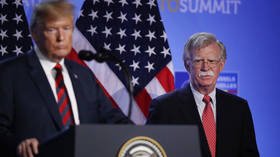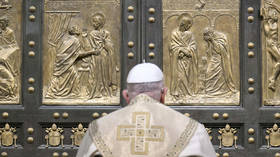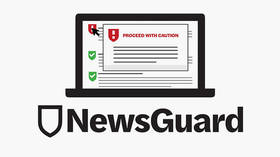Goad, threaten, backtrack: Trump & Bolton’s Iran policy is confusing, dangerous & achieves NOTHING

Washington’s fuzzy and high-drama “maximum pressure” approach to Iran has no realistic endgame – but is good for making the world a more unstable place for both America’s adversaries and allies.
National Security Advisor John Bolton’s Tuesday claim that US diplomats are “surging” across the Middle East in search of a “path to peace” only to encounter “deafening silence” from Tehran might have ordinarily seemed merely mendacious.
But considering the extraordinarily rich array of pronouncements and actions from the White House in the past week, most are no longer sure if Bolton is playing the diplomat, gaslighting us or actually believes his words. If – surely, like many of the world’s foreign ministers – you are struggling to keep up, here is the timeline since Thursday, when Iran admitted shooting down an American drone:
Thursday: Donald Trump calls Iran’s actions a “big mistake” and hints that a military response is possible.
Friday: Trump says that he cancelled a “pretty heavy” air strike 10 minutes before the start to spare 150 Iranian lives, but insists the US military is “ready to go.”
Sunday: Trump says Iran faces “obliteration like you’ve never seen before” if it doesn’t restrict its nuclear program, while Bolton warns not to “mistake US prudence and discretion for weakness.”
Monday: Trump signs off on “strong sanctions” against Iran’s Supreme Leader Ayatollah Ali Khamenei and Foreign Minister Mohammad Javad Zarif.
Tuesday: Bolton says Washington “has held the door open for real negotiations” with Iran over its nuclear program, and that it now must “walk through that open door.”
Madness or method?
Plenty of outside observers claim these zigzags and mixed signals represent a chaotic administration where Trump is being pulled aside in turn by the hawks and doves on top of his own ever-changing mind, or that perhaps Bolton, who has spent the past several days in Israel, has gone rogue.
Also on rt.com ‘Dialogue at gunpoint’: Bolton says Iran’s ‘silence’ is DEAFENING while it’s actually pretty vocalBut through the noise, the signatures of both men can be clearly deciphered. From his days at corporate negotiating tables, and throughout his presidency, Trump has endorsed strategic ambiguity. His “You’ll find out!” to reporters who asked him last week about the imminent strike was the kind of kindergarten fog-of-war that he has customarily tried to summon over American foreign policy.
Meanwhile Bolton, who has called for strikes and regime change in Iran at least since 2007, and has likely dreamt of this since the Islamic Revolution, has been one of the key proponents of maximum pressure. That is making Iran’s life hell through economic sanctions, diplomatic ostracism, military threats, and other measures short of war, such as cyber attacks, to force it to the negotiating table. So, when he says that he is ready to talk, he probably is – to a demoralized and scared adversary and on America’s terms.
Poking Iran
So, there is an American policy – but is it a good one?
The economic devastation wrought on Iran by cancelling Obama-era sanctions relief has been surprisingly effective – at making ordinary Iranians poorer. The economy is expected to shrink six percent this year, inflation is in double figures, and oil production at a historic low.
But what it hasn’t brought is regime change to Iran, which has hunkered down and now resents America with a new vigor, nor has it induced its leaders to new compromises. Tehran has said that the latest sanctions have “closed the path of diplomacy.”
Also on rt.com US sanctions on Khamenei & Zarif ‘close path of diplomacy’ – IranIran continues to work towards exceeding the uranium stockpile limit, set by the 2015 international nuclear deal, this week.
But perhaps this is what Bolton wants too. By tightening the vice around the Islamic Republic, perhaps US hawks are hoping for an escalation that will usher in the sweet, sweet sound of American and Israeli bombs dropping on Iranian soil.
Also on rt.com ‘Unacceptable’ to lump Iran together with ISIS as Middle East’s ‘chief security threat’ – MoscowMaybe we are currently in stage two of the plan, when Iran is meant to be lashing out: here come the tanker incident earlier this month, which the US made every effort to pin on Tehran with limited success, and the drone takedown. These incidents are not yet casus belli, but for Bolton, who played a key role in creating THAT dossier prior to the Iraq war in 2003, the next one could be.
Strategy-free zone grows
But what then?
The hawks must realize that there is no appetite among the American public to endorse another full-scale conflict worth trillions and with thousands of dead, and Congress will never vote it through either.
Meanwhile, Trump’s own common-sense instincts are for supporting US allies in the region, but keeping America itself out of long-term military adventures. Every time an opportunity has come to use firepower, the sitting US president has chosen to deploy rhetoric and the most token show of force possible. And he will definitely not want a new war 18 months before an election.
Also on rt.com Trump threatens Iran with ‘OBLITERATION’ by ‘overwhelming force’ if it attacks ‘anything American’Iran is cognizant of all this, so for all the ideas of a credible threat that Bolton theoretically summons with his mere existence, they know that Washington will not dare fight them.
So, instead of a resolution – violent or diplomatic – the US seems to be orchestrating a flaring of tensions that merely entrenches each side as enemies, and makes the cost of compromise higher for each actor.
Even to those who see the US national interest in the same narrow way as Bolton and Pompeo, these two are hardly executing some kind of masterplan. What are they trying to achieve? In fact, insofar as Bolton is concerned, has he ever actually managed to successfully resolve a single foreign policy scenario to America’s favour – from Iraq to Venezuela to now Iran?
One anonymous “former senior official” recently called US treatment of Iran a “strategy-free zone” in which Washington has isolated itself, not its adversary.
Most galling of all for the present administration, the concept of a “strategy-free zone” was popularized by erstwhile Trump defense secretary Jim Mattis when describing Barack Obama’s policies in the Middle East (might he have been the source for that new quote himself?). The very ones Trump never tires of condemning.
That administration failed because it was concerned with being seen to do the right thing, without actually doing anything effective. This one is just as ineffectual, but all the noise and fireworks are waking up the neighbors and could leave someone short of an eye.
By Igor Ogorodnev
Igor Ogorodnev is a Russian-British journalist, who has worked at RT since 2007 as a correspondent, editor and writer.














